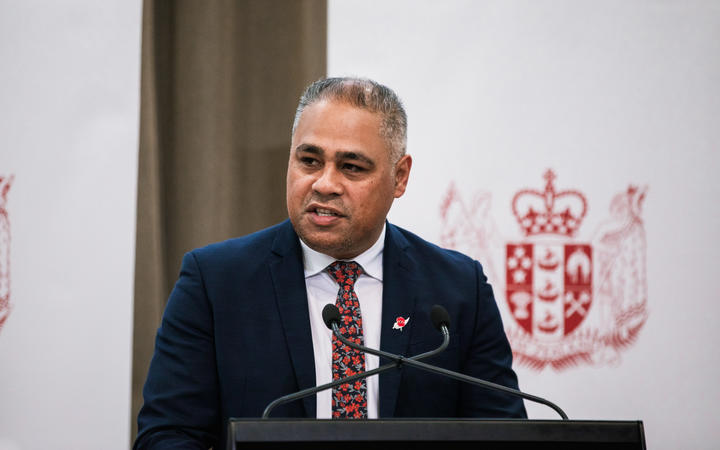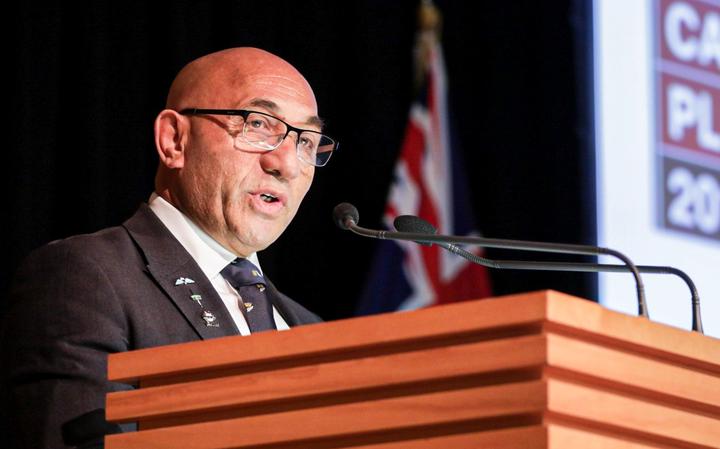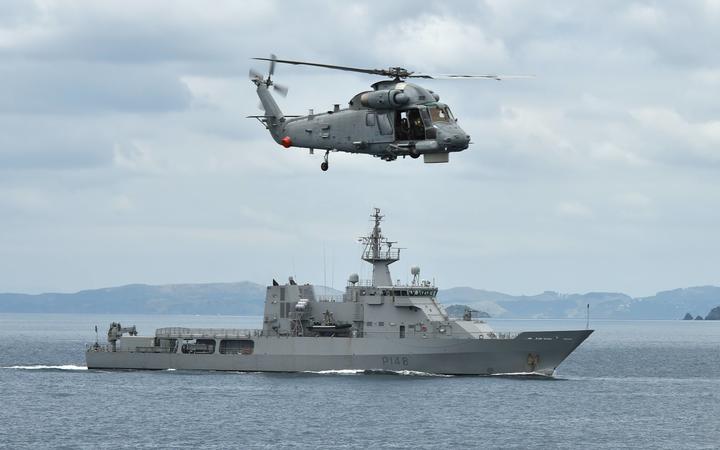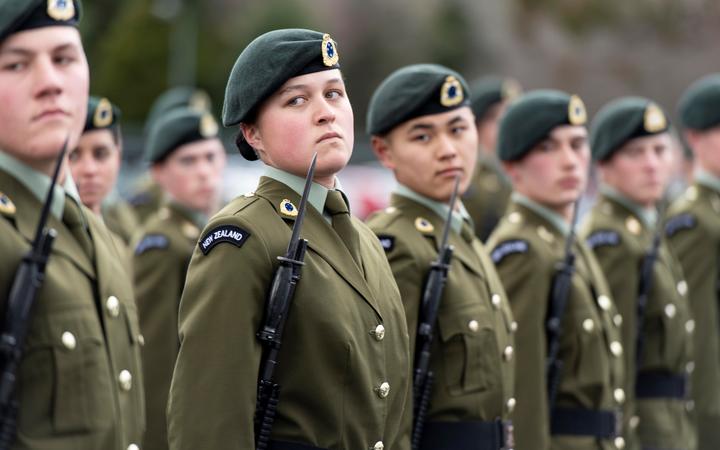Opinion - This week New Zealand was officially pronounced the second most peaceful nation on Earth - just behind Iceland - in the publication of the annual Global Peace Index. New Zealand's high "peacefulness" score was based on the country's low amount of violence, conflict and terrorism.

Defence Minister Peeni Henare said defence spending is 'business as usual'. Photo: RNZ / Samuel Rillstone
However, New Zealand was marked down in the results this year because of "an increase in weapons imports and military expenditure." You can read the full report here: Global Peace Index 2021.
Also in this last week, Labour has reconfirmed that the massive increases in defence spending agreed to during the last term of government are to be largely retained.
Defence Minister Peeni Henare stated that although some changes are being made to the details and timing of planned expenditure, it was going to be largely business as usual under the new Labour administration.
Yesterday Henare appeared at Parliament's Foreign Affairs, Defence and Trade Select Committee, where he is reported to have "said the plan remained to spend billions of dollars on new frigates, aeroplanes, combat vehicles, and long range drones beyond 2030" - see Thomas Manch's Defence Minister Peeni Henare says he won't slash plans to spend billions on military hardware.
According to this article, the Secretary of Defence Andrew Bridgman was at the same hearings and said, "a redrawn Defence Capability Plan would not mean scrapping planned projects, but moving them 'out a bit'."
In contrast, the Green Party spokeswoman on Defence, Golriz Ghahraman, suggested that the Government was being irresponsible in continuing with plans to purchase "outlandishly expensive" frigates.

Former Defence Minister Ron Mark. Photo: RNZ / Dom Thomas
Labour's big military spending not just driven by NZ First
The Labour Government's determination to continue with plans to spend an additional $20 billion on military hardware and infrastructure might have surprised some.
This significant increase in money for the military was committed during the last term in government. It took the Defence Budget to record highs not seen since the depths of the Cold War in the 1960s - and significantly more than the previous National Government was willing to fork out.
I covered these massive military spending increases in columns in 2018 - see: Where are the protests over the Government's new 'submarine-killers'?, and 2019 - see: The camouflaged military spend-up.
It was assumed by many that the last Labour Government's extravagant expenditure on the military had been driven by then-coalition partners New Zealand First.
With Ron Mark as Defence Minister, there had been announcements of spending on frigates, tanks and armed aircraft. At the same time, Winston Peters as Foreign Minister re-oriented the country back towards an alliance with the United States, while warning of looming threats arising from China.
READ MORE
- China on the move...
- Why is China on the move in the South Pacific?
- ‘A matter of time’: New Zealand’s foreign minister warns China ‘storm’ could be coming
- NZ risks giving China 'coercive power' over economy - US General
So, with NZ First and Ron Mark out of the picture, and Labour MP Peeni Henare in charge of Defence, there was an assumption that the Government might have a change of heart about priorities and become a lot less hawkish. This clearly isn't happening, and Labour is largely continuing with NZ First's approach to defence spending.
Some of what Henare has recently said might give reason to believe a small degree of reorientation in military spending may still occur.
Last Friday RNZ political editor Jane Patterson reported on possible changes in defence spending in her article, Covid-19 forced govt to cut back defence spending - Peeni Henare.
According to this, the $20b in Labour's new spending might be pared back a little, with Henare saying a "trim" was being considered by the Minister of Finance, and several options were being considered.
Henare is quoted saying that a "policy reset" is coming, which will give defence spending a more Labour look.
For example, this might involve some of the new money being spent on local military purchases and infrastructure, with Henare saying: "We want to be stimulating our economy and how do we do that in the defence portfolio? One way not to do that is to send large amounts of our money offshore."
The same article also quotes Golriz Ghahraman saying that too much was being spent on defence at the expense of social spending: "It was already incredible what the coalition spent and it was Labour that made that agreement with New Zealand First last term and we saw just billions of dollars be committed to the defence, war-making vessels, essentially."
She "wants the spending pulled back considerably, including scrapping the second frigate upgrade."
For more on the same issue, you can listen to Patterson's Focus on Politics for 25 June 2021.
The high levels of expenditure have not only survived the exit of NZ First, but also the arrival of Covid, with its much greater calls on funding.
In fact, during the height of the Covid crisis, while NZ First was still in Government, Ron Mark dealt with such questions, defending the continued splurge of money on military hardware with the justification of combating climate change - see George Block's Defence Minister defends huge military spend amid economic downturn.
Following the election, outgoing Defence Minister Ron Mark says there's a "nervousness" in military circles that without NZ First in government, spending would be significantly cut - see Thomas Manch's 'Job done': Outgoing Defence Minister Ron Mark warns Labour must continue military spending.
Mark is quoted: "People always get nervous when Labour have the helm on their own. Helen Clark cancelled the F16s last time, there's that degree of nervousness… But I don't think they'll do that, because I think I put my cases so robustly".
Mark argues that the next purchases required are new Seasprite helicopters and a Southern Ocean Patrol Vessel. In terms of the latter, Ghahraman is cited as opposing this due to its "war-making" capability.
At this time others speculated that defence purchases would be put on hold or cancelled.
For example, Robert Ayson from Victoria University of Wellington said that military hardware might not to be purchased without NZ First at the Cabinet table: "So things like a third offshore patrol vessel, another vessel along the lines - perhaps a larger version of the Canterbury with greater capacity, perhaps the idea of expanding the army - I think a lot of those sorts of projects are going to be less likely and at the very least delayed" - see Jonathan Mitchell's Uncertainty around billions in Defence Force spending.

HMNZS Otago with an embarked SH-2G(I) Seasprite helicopter on patrol. Photo: NZDF
Debates on levels of military spending
In response to Henare's statements this week on spending, left-wing commentator Gordon Campbell has written a must-read essay on the case for large cuts to the burgeoning defence budget, even suggesting that maybe it's time to get rid of the military entirely - see: Why we should abolish the military.
Campbell argues that the military bosses have conned Labour into huge expenditure on military hardware by presenting their existence as being about more progressive and non-combat roles such as combating the effects of climate change, dealing with disaster relief, and protecting fishery resources, and humanitarian needs.
READ MORE
- Defence Minister Peeni Henare says he won't slash plans to spend billions on military hardware
- New Zealanders overwhelmingly back promoting human rights in China, even if it damages economic ties - research
- China President Xi Jinping warns foreign forces who 'bully' will 'have their heads bashed' as Communist Party marks centenary
- Chinese Communist Party spies infiltrating NZ universities, lecturers suspect
He suggests that if those tasks were really the goal, the money would be spent much more efficiently on non-military services to deal with those.
His main point in this regard: "None of these arguments make any sense. If that is the real world role for our armed forces, all of those jobs could be done more efficiently and at a fraction of the price by a civilian force trained and kitted out specifically to do such work. Meaning: We don't need a Poseidon squadron jammed full of ultra-expensive anti-submarine gear to police our [Exclusive Economic Zone], and to look for lost sailors."
In reality, Campbell argues, the new expenditures are about locking New Zealand into traditional defence alliances, which are actually against the national interest.
They are not about defence of New Zealand, but about being able to participate in US-led wars in other parts of the world. The membership of this US-led club, Campbell argues, comes at a cost of about $2b each year, and it's not apparent that this is money well spent.
The opportunity cost of these "billions poured down the drain irrationally" is investment in infrastructure and social services.
Campbell suggests that New Zealand's defence spending - at 1.5 percent of GDP, and $US270 per capita - is quite substantial. He thinks it's far too much.

Photo: Supplied / NZDF
For the opposing view, you can listen to a recent podcast by former Associate Defence Minister Heather Roy and colleague Simon Ewing-Jarvie: How much national security can NZ afford?. In this, they argue how money is allocated to national security and ways to measure this.
Simon Ewing-Jarvie, who is a former army lieutenant colonel, has written at length about the necessary funding of defence in an open briefing he has supplied to Peeni Henare when he became the new minister - see: The Long handshake: Additional briefing to the incoming Minister of Defence.
On the question of funding levels, Ewing-Jarvie says: "The fact is we do not spend enough on defence when it is viewed in the context of national security and the long lead times required to increase capability. Expressing defence spending as a percentage of GDP isn't a useful measure. The 2 percent of GDP target often referred to is simply a message sent out from the US to its allies years ago to try to get NATO members to front up and not assume the US would foot the bill for everyone. We could spend twice the amount we currently do and still not achieve the desired outcome."
Finally, the new Defence Minister has been promising announcements on his portfolio, but they never seem to arrive.
Back in April, defence academic Robert Ayson noted Henare's lack of apparent work or thinking about where the portfolio is going, and called on him to get moving, warning that if he didn't then the US would be the one setting the agenda for New Zealand - see: Defence Minister goes absent without leave.






